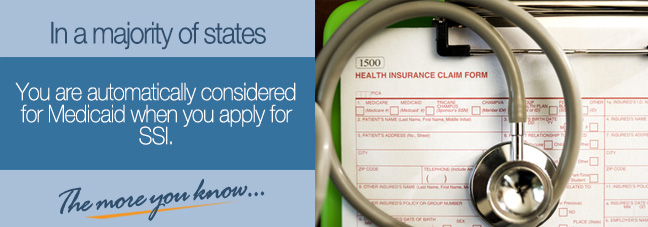Medicaid is the medical insurance program that is intended to provide medical care for those on SSI. A person can continue receiving Medicaid even if he or she is deemed ineligible for SSI. It covers several things that Medicare does not, including inpatient and outpatient care.
Medicaid is administered by The Center for Medicare and Medicare Services in individual states. To be eligible for Medicaid, generally you must have be:
- eligible for SSI
- still be disabled
- have a gross income that cannot replace Medicaid or SSI
- need Medicaid in order to work

Unlike Medicare, states regulate Medicaid, and therefore it comes with different eligibility regulations.
There may a long waiting period in regard to Medicaid. In some states, those that qualify for SSI are automatically eligible for Medicaid, in some other states, waiting times can last from between one month and five years.
In addition, other things can influence the wait time, such as assets that have been transferred, the size of the applicant's’ family, etc. It is important for applicants to inform themselves on their state regulations regarding Medicaid. The easiest and best way to do this is to consult an attorney in the state that is experienced with handling SSI.
Depending on the state a recipient lives in, he or she may have to file separately for benefits. The majority of states and territories automatically apply SSI recipients into Medicaid. Others require a separate application altogether, regardless of whether or not the qualifications to receive SSI and Medicaid are one and the same. It is important to find out the requirements for your state and file for SSI immediately, as this should be done first.
If you live in the following states, you will not need separate applications for SSI and Medicaid:
| Alabama | Arizona | Arkansas |
| California | Colorado | Delaware |
| District of Columbia | Florida | Georgia |
| Indiana | Iowa | Kentucky |
| Louisiana | Maine | Maryland |
| Massachusetts | Michigan | Mississippi |
| Montana | New Jersey | New Mexico |
| New York | North Carolina | Pennsylvania |
| Rhode Island | South Carolina | South Dakota |
| Tennessee | Texas | Vermont |
| Washington | West Virginia | Wisconsin |
| Wyoming |
Residents of other states and territories should contact the Center for Medicare and Medicare Services in their state to learn about the specific application for Medicaid.
Although you can certainly file for SSDI benefits on your own, it is recommended that you seek the assistance of an attorney or advocate who specializes in SSDI. There are several reasons why this is a good idea. An attorney or advocate can:
- help to get a hearing faster
- eliminate the need for a hearing altogether
- provide a higher chance of approval
- provide knowledge and advice while applying
- keep your case confidential
In short, a hiring a disability attorney or advocate is incredibly important when considering applying for either SSI or SSDI.